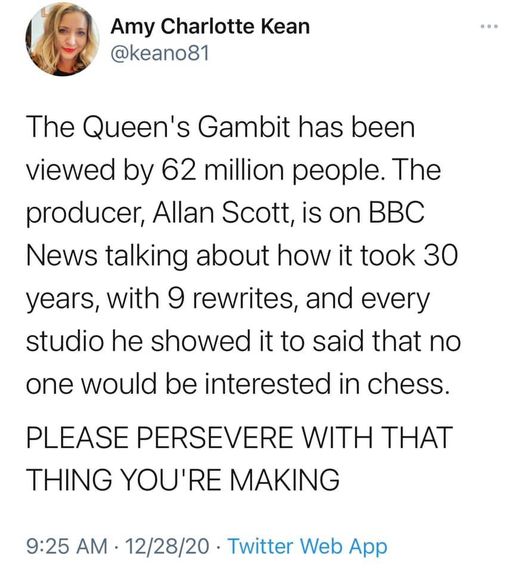Over the years I’ve been asked a version of the same question when it comes to starting a personal blog:
What should I write about that will become popular?
What should I write about that will go viral?
What should I write about that will make me money?

Okay, that’s three questions, but really, it’s just one question asked differently. What most everyone wants to know is:
What should I blog about that will succeed to make money?
The answer is as simple as it is complicated and has two parts:
1) Create a blog that matters
2) And forget about the money
You read that right.
You may have noticed that I recently started a new blog. It’s not about a popular topic with a lot of potential for going viral, or for that matter, making money. But I can tell you this, it’s the most excited I have been about starting a new blog and sharing something I’ve been interested in since I was a kid.
Considering my enthusiasm for the subject (I’ll get to that in a moment), I believe I can and will maintain the blog for a long time to come without the need for a financial incentive.
However, the vast majority of personal blogs are abandoned.
Up to 95%, in fact.
The #1 reason why so many blogs are abandoned is that people started them for the wrong reasons.
It’s a sad reality but most personal bloggers start their blog because they think they can make loads of money doing it via advertising, or launching a book, or promoting some other product. Sorry, not sorry, but that’s a terrible reason to start a blog and none of the above brings in much more than a few bucks, if any–anyway.
The odds of actually making good money with a blog are extremely low.
Out of the personal blogs that are not abandoned less than a fraction make money via blogging alone. I don’t care who tries to sell you on the idea you can get rich from blogging, all I can say is, run. It’s very unlikely to happen.
Indulge me, here. Forget about starting a blog for money for a moment.
Whether you are an introvert or a charismatic rock star, the best personal blog to create for you should be about something you care about—something that matters to you! The more you care, the better.
In fact, that’s the prime way even an introvert like me can become a charismatic rock star online! By blogging about something you’re into, something you care about more than anything else in the world, and from your own education and experience, you know your topic to the nth degree.
If you’re thinking of starting a personal blog and you’re looking for a topic to write about, you’ve already failed!
I mean it.
You already know what you should be sharing, trust me. More importantly, trust yourself.
Listen, look inward and write about what you care about the most, I don’t care if it is newborn kittens, visiting Disneyland, climbing redwood trees, or traveling to haunted locations around the world. It will matter because you genuinely care about it.
There’s something about talking about, writing about, and sharing something one really, truly cares about and enjoys enthusiastically that supersedes everything else.
It’s folly to find a popular topic where others are having success and simply start a blog to try to copy someone else’s success in a genre you care very little or nothing about. This happens more often than you might realize. In fact, you might even be caught up in it right now.
I’ve had a lot of success with Positive Writer because I care about writing and I enjoy talking about what has helped me become a prolific writer. I was successful with my previous blog, ADDer World, about ADHD, for the same reason. I cared about it. I’m very passionate about the topics.
Now, I’m creating a new blog about something I’m even more passionate about and have been interested in longer than anything else. And frankly, I’m really not interested in making money from it and although I have a book that mixes well with the subject, it’s not for the book. Actually, I hope the opposite is true and the book attracts people to the blog.
You read that right.
It’s not about creating a popular blog or about making money. It’s strictly about my passion for travel and visiting ruins across Europe, which I have been doing for dozens of years, with the twist that I also share the evidence I’ve gathered about rare, unexplainable experiences I’ve had visiting some of those places, potentially paranormal.
Nothing has fascinated me more. So now, it’s time I take my own advice and share my experiences on my new blog.
The new blog is so non-mainstream that it has very little chance to become a popular, viral type of blog. But I don’t care. And, that my friends, is probably why it will attract interested readers anyway. Because I sincerely care about the experiences and stories I’m sharing, first and foremost.
If you want to create a personal blog that matters, consider doing it for the same reasons.
Did You Know: Seth Godin created his blog to share his thoughts daily, he accepts no guest posts, no ads, and any affiliate Amazon funds he generates are donated? He writes every word. He doesn’t do it to make money. Oh, and, it’s also considered the #1 blog on the planet.
If you’re someone who doesn’t have an overwhelming personality, that’s okay.
It’s probably even better that way, you can create an alternate blogger identity online and be a rock star IF you share what you truly care about! But ONLY if you care about it.
It’s hard to fake passion, if not impossible.
Create a personal blog about what you care about and enjoy it for what it is, nothing more and nothing less, and that my friends, is what matters.
Here’s the thing, if you follow this simple advice and not give up even when it really doesn’t seem like anyone else cares or will care, that’s when you can learn and improve your skills as a writer and blogger without worry about making mistakes.
Sooner or later, if you keep at it and you have a unique point of view, readers and viewers will find you. When that happens maybe you can monetize, but if it’s a personal blog, I beg you don’t worry about that. Do it for you, first. See what happens.
There’s a tweet making the rounds for good reasons, it states:
The Queen’s Gambit has been viewed by 62 Million people. The producer, Allan Scott, is on BBC News talking about how it took 30 years, with 9 rewrites, and every studio he showed it to said that no one would be interested in chess. PLEASE PERSEVERE WITH THAT THING YOU’RE MAKING
@Keano81

So, you know what to do. Create a blog that matters to YOU.
If you would like to take a gander at my new blog, it’s:
Bryan’s Paranormal Travel Blog
What’s your blog? Link to it in the comments. Or, if you’re still thinking of the blog you want to create, tell me about it in the comments.

